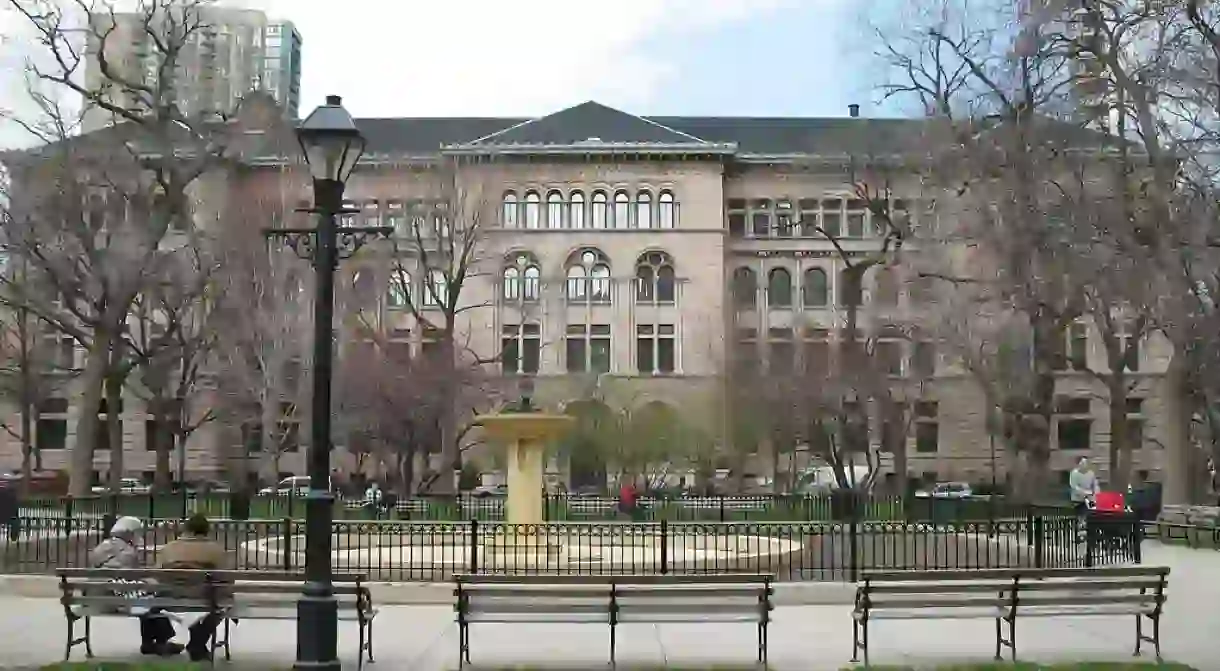A Brief History Of The Newberry Library, Chicago

It’s not part of Chicago’s public library system, but visitors to The Newberry Library will be delighted to know that this independent research center still offers free entry. A fixture on the Near North Side since 1887, this oft-overlooked institution has a lot to offer the average Chicago resident with its specialized collection that spans six centuries.
The Newberry was founded on July 1st, 1887 under direction from the will of Chicago businessman Walter L. Newberry, who wanted his fortune to go towards a ‘free public’ library north of the Chicago river. Moving locations three times before settling in its current building on West Walton Place in November 1893, the library hosts a collection of several hundred thousand rare books and reference materials. Convenient public transportation and exposure to sunlight were strong factors in the decision to relocate to Walton Place, and the building has settled well with several expansions and adaptions over the past 123 years.

Donated materials and purchases are the primary methods of collection that the Newberry has consistently utilized to acquire its vast reserves. As it remains a research and reference library, the collection focuses mainly on the humanities, “with an emphasis on original sources for the study of European and Western Hemisphere history, literature, and culture since the late medieval period.” Today it boasts a staggering load of 1.5 million books, 5 million manuscript pages and 500,000 historic maps.
Notable early acquisitions consist of Florentine Count Pio Resse’s music library, a collection of rare books and manuscripts from Henry Probasco of Cincinnati and the 17,000-volume assortment of language and linguistic material of Prince Louis-Lucien Bonaparte. Other prominent topics the Newberry collection excels in include American Indian and Indigenous Studies, Chicago and the Midwest, Genealogy and Local History, music, religion, local business and local journalism. Though Walter L. Newberry himself had an impressive personal book collection to leave to his future library, it was destroyed in the Great Chicago Fire of 1871 just three years after his death.
In the 1940s, the Newberry began offering fellowships to the public for advanced research, available by application. Though anyone can obtain a reader card to access the library’s materials, this new opportunity paved the way for a more permanent research home among the stacks and gain private reference resources. The program still thrives today, and scholars can apply for short-term or long-term fellowships online. The Newberry even offers semester-long fellowships in partnership with Midwest liberal arts colleges and local Chicago universities.
The Newberry has been heavily involved itself in free public programming since its inception, and after decades of success a new book-stack tower was built in 1982 to further facilitate staff activities. Today it offers countless educational programs year-round, including those for teacher development, adult education, undergraduate seminars and humanities-specific studies. In addition, it’s also a home to the famous annual Newberry Book Fair. The four-day festival celebrated 32 years this July and filled its first floor with thousands of donated books for purchase. The sale branches out from the Newberry’s typical fare and accepts all literature genres, including fiction, poetry, biography, psychology and even sports. The library begins taking donations for the 2017 fair after Labor Day.
Check out an upcoming free meet-the-author event with Natalie Y. Moore on August 31st, 2016. The Chicago native and WBEZ reporter wrote The South Side: A Portrait of Chicago and American Segregation.













